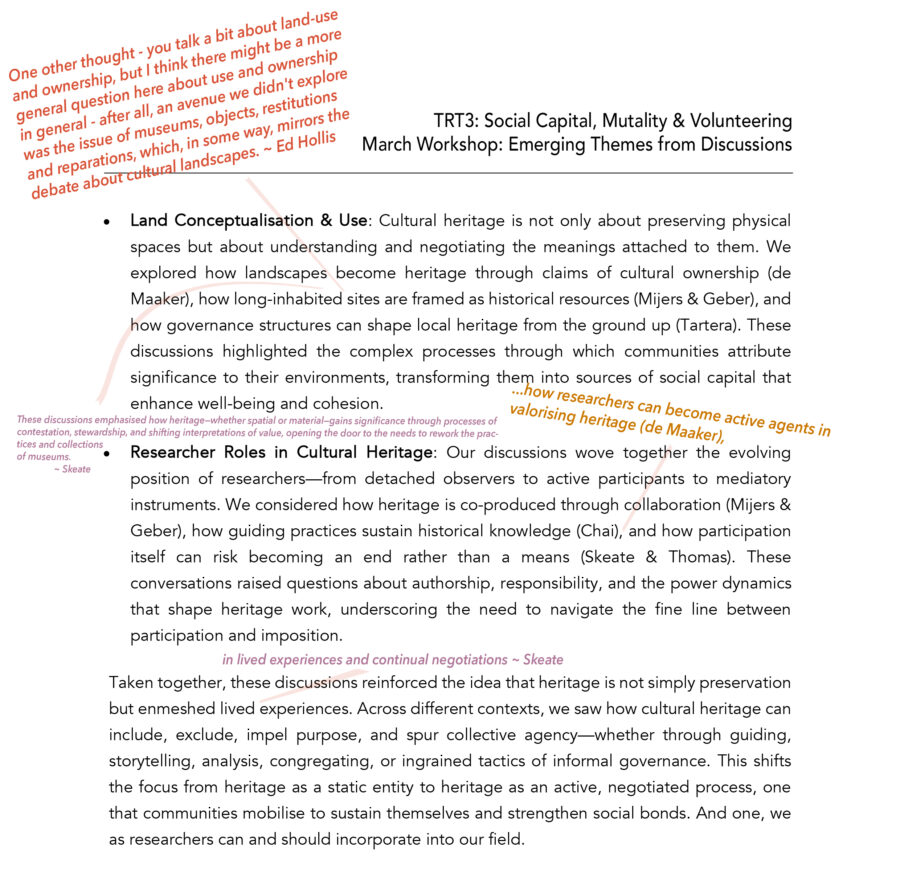Thank you to all who attended our March 14th Workshop, the above image lends some insight into our follow-up discussions about it. All in all we found it a be productive event that raised two prominent themes:
Land Conceptualisation & Use: Cultural heritage is not only about preserving physical spaces but about understanding and negotiating the meanings attached to them. We explored how landscapes become heritage through claims of cultural ownership (de Maaker), how long-inhabited sites are framed as historical resources (Mijers & Geber), and how governance structures can shape local heritage from the ground up (Tartera). These discussions highlighted the complex processes through which communities attribute significance to their environments, transforming them into sources of social capital that enhance well-being and cohesion. They also emphasised how acts of contestation and stewardship continuously reshape both spatial and material heritage, prompting reconsideration of museum practices and collections.
Researcher Roles in Cultural Heritage: Our discussions wove together the evolving position of researchers—from detached observers to active participants to mediatory instruments. We considered how heritage is co-produced through collaboration (Mijers & Geber), how guiding practices sustain historical knowledge (Chai), how researchers can become active agents in valorising heritage (de Maaker), and how participation itself can risk becoming an end rather than a means (Skeate & Thomas). These conversations raised questions about authorship, responsibility, and the power dynamics that shape heritage work, underscoring the need to navigate the fine line between participation and imposition.
Taken together, these discussions reinforced the idea that heritage is not simply preservation but enmeshed lived experiences. Across different contexts, we saw how cultural heritage can include, exclude, impel purpose, and spur collective agency—whether through guiding, storytelling, analysis, congregating, or ingrained tactics of informal governance. This shifts the focus from heritage as a static entity to heritage as an active, negotiated process, one that communities mobilise to sustain themselves and strengthen social bonds. And one, we as researchers can and should incorporate into our field.
Special Thanks: to Candace Thomas, who joined in from outside the Una network to discuss her research and insight in the context of TRT3’s theme. Candace is a PhD candidate in Sociology at University College Dublin, who joined Graham for an interesting back-and-forth on participation in the context of his work, which involves the longstanding placemaking of Candace’s Showpeople community in Glasgow.
You can read some of Candace’s very topical work here, as well as here.
Seed-Funding Segment Recap: The 2022 TRT3 survey underscored the need for debate, knowledge exchange, and collaboration among doctoral candidates. Key priorities included seminars, workshops, fieldwork-based projects, and partnerships with heritage professionals. There was strong interest in joint-initiatives that actively involve researchers in shaping case studies and building networks.
To build on this momentum, we invite further input on potential joint-initiatives, funding strategies, and next steps. If you have ideas or would like to contribute, please send them to Graham Skeate (g.skeate@sms.ed.ac.uk), and please feel free to mark-up and alter this text itself so we can incrementally arrive at a definitive document. A central goal of this TRT is to generate content, so contribute however suits you: photos, documents, emailed comments, audio recordings, social media posts. No need for tailored, edited or precious contributions at this point—participation is most important.

